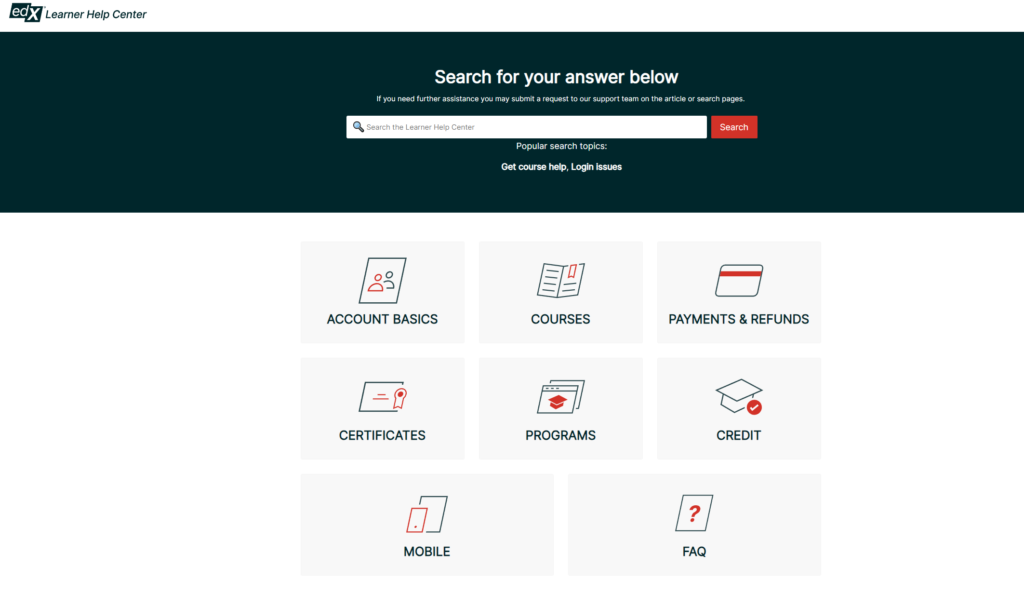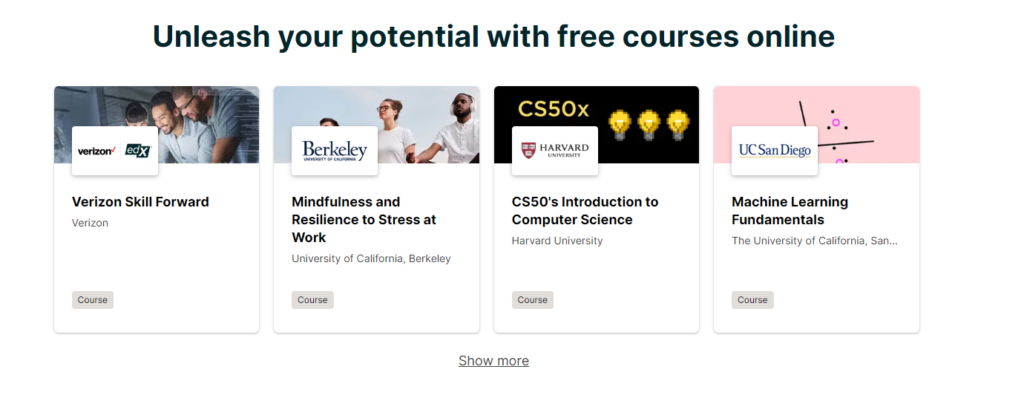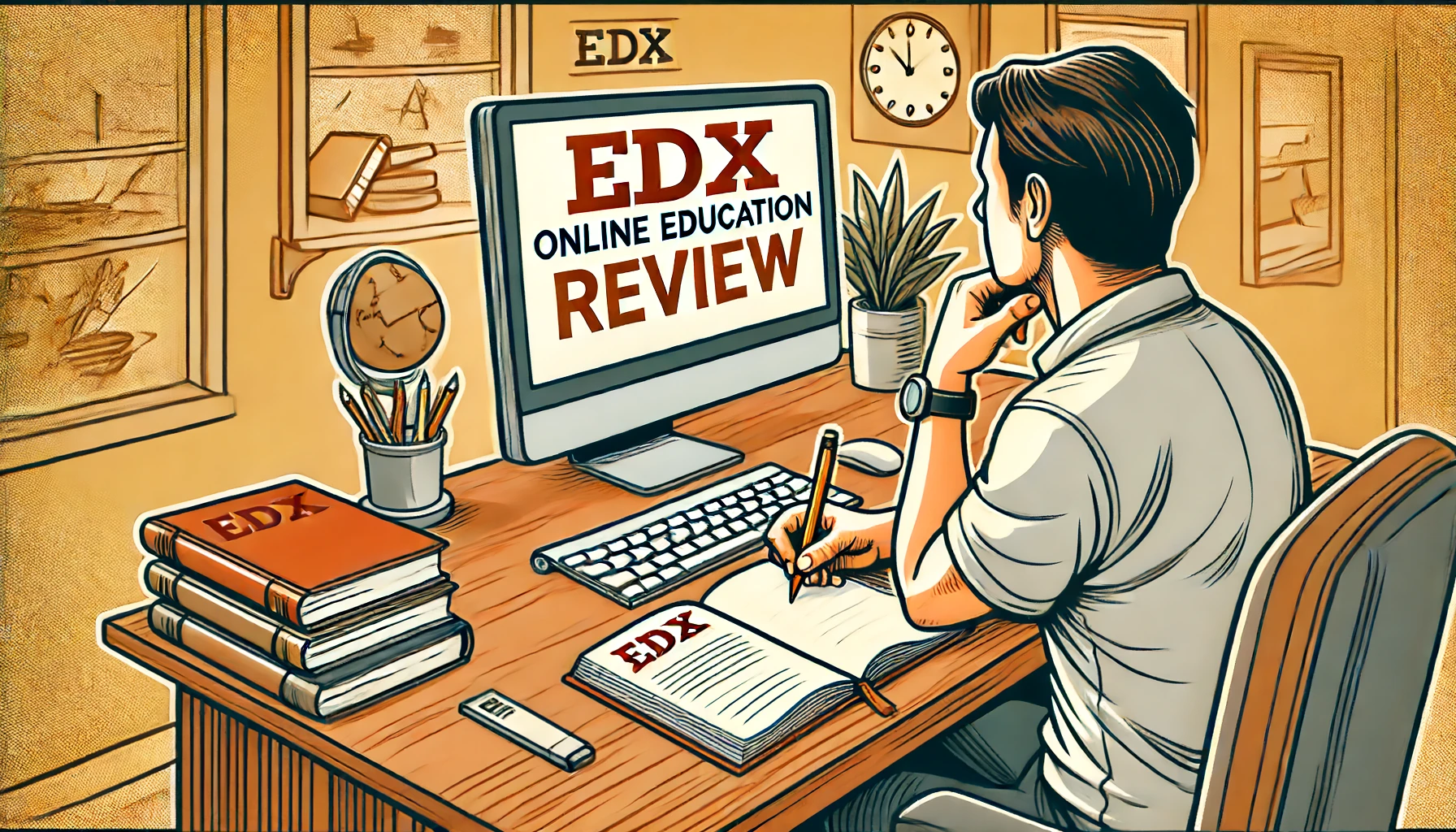Edx is a prominent player in the online education sector, offering a wide array of courses and programs from prestigious institutions around the world. In this Edx review, we will cover several key aspects of the Edx platform to help you determine if it’s the right fit for your educational needs. We’ll explore the variety and quality of courses available, the usability of the platform, the support and resources provided, the cost and value of the courses, the accreditation and certification options, and user feedback and ratings. Additionally, we’ll compare Edx to other popular online learning platforms to give you a comprehensive understanding of its strengths and weaknesses.
| Topic | Pros | Cons |
| Course Variety | Wide range of subjects and specializations from prestigious institutions | Some niche subjects might have fewer offerings |
| Course Quality | High-quality content, expert instructors, use of multimedia and interactive elements | Quality can vary between courses, some materials may be outdated |
| Platform Usability | User-friendly interface, robust mobile app, accessibility features | Initial navigation can be overwhelming for new users, occasional technical glitches |
| Support and Resources | Responsive customer support, comprehensive supplemental materials, financial aid availability | Limited real-time support, variability in the availability and quality of supplemental materials |
| Cost and Value | Free audit option, reasonable pricing for verified courses, financial aid available | High cost for certificates and advanced programs compared to some other platforms |
| Certification and Accreditation | Recognized certificates, valuable for career advancement, partnerships with top universities | Some employers may not recognize certificates, costs can be substantial |
| User Feedback and Ratings | High user satisfaction, positive reviews for content quality and flexibility | Some users report technical issues, variability in course quality |
| Comparison with Other Platforms | High-quality academic content, flexible learning options, strong reputation | Higher costs than Udemy, less focus on K-12 education than Khan Academy |
Course Variety and Selection
Edx shines with its vast array of courses across numerous disciplines. Whether you’re into computer science, humanities, business, or health sciences, there’s likely a course for you. The platform collaborates with top-tier universities and institutions, bringing an impressive selection of courses led by distinguished professors and industry experts. This variety is fantastic for learners who want to explore different fields or deepen their knowledge in a specific area.
On the downside, while the selection is broad, some niche subjects might not have as many offerings or the depth you’d find elsewhere. Additionally, the sheer volume of courses can be overwhelming for new users trying to navigate and find the right course for their needs. Despite these minor drawbacks, Edx’s extensive course catalog remains one of its strongest features, providing ample opportunities for personal and professional growth.
Overall, if you enjoy having a wide range of learning options at your fingertips and appreciate courses from prestigious institutions, Edx is a solid choice. Just be prepared to spend some time sifting through the options to find your perfect fit.
Popular Edx Courses
Computer Science: “CS50’s Introduction to Computer Science” by Harvard University
- This is one of the most popular courses on Edx, offering a comprehensive introduction to computer science and programming. It covers a wide range of topics and languages, including C, Python, SQL, and web development.
Business & Management: “MicroMasters Program in Business Management” by the Indian Institute of Management Bangalore
- This program covers core business management concepts, including finance, marketing, and operations. It’s designed to provide learners with the skills needed to excel in business roles.
Health & Safety: “Introduction to Project Management” by the University of Adelaide
- This course is ideal for those looking to develop project management skills. It covers essential topics such as project planning, risk management, and team leadership.
Course Quality
Edx offers high-quality courses developed by some of the world’s leading universities and institutions. The depth and comprehensiveness of the content are impressive, with courses often including video lectures, readings, quizzes, and interactive assignments. For example, the renowned “CS50’s Introduction to Computer Science” by Harvard University is known for its rigorous and engaging curriculum, making complex concepts accessible to beginners while still challenging advanced learners.
On the positive side, the instructors are typically experts in their fields, bringing a wealth of knowledge and real-world experience to their teaching. This expertise is evident in the well-structured lessons and the clear, insightful explanations provided. Additionally, the use of multimedia elements like videos, interactive exercises, and discussion forums enhances the learning experience, making it more engaging and effective.
However, the quality can sometimes vary depending on the course and instructor. While many courses are top-notch, a few might not meet the same high standards, with some users reporting issues like outdated materials or less engaging presentation styles. Another potential downside is that the interactive elements, such as discussion forums, can be hit or miss in terms of participation and moderation.
Overall, Edx generally delivers excellent course quality, particularly for those courses offered by its partner institutions. Learners can expect a robust and enriching educational experience, though it’s always a good idea to read reviews and course descriptions to ensure the course meets your expectations.
Platform Usability

Edx’s platform usability is generally well-regarded, offering a clean and intuitive interface that makes navigation straightforward. The layout is user-friendly, with clear menus and easy access to course materials, progress tracking, and certificates. The dashboard provides a concise overview of your enrolled courses, upcoming deadlines, and recent activity, which is helpful for staying organized.
On the positive side, the mobile app is a significant asset for learners on the go. It mirrors the functionality of the desktop version, allowing you to watch video lectures, participate in discussions, and complete assignments from your smartphone or tablet. This flexibility is great for fitting learning into a busy schedule. The platform also supports various accessibility features, such as closed captions and screen reader compatibility, ensuring it caters to a diverse range of users.
However, there are a few areas where Edx could improve. While the overall navigation is intuitive, new users might find the initial orientation a bit overwhelming due to the vast amount of content and features available. Additionally, some users have reported occasional technical glitches, such as videos not loading properly or issues with the mobile app syncing progress with the desktop version.
Despite these minor drawbacks, Edx’s platform usability is generally strong. The ease of use, combined with the convenience of a robust mobile app and accessibility features, makes it a solid choice for online learners looking for a flexible and user-friendly learning environment.
Support and Resources

Edx provides a robust array of support and resources to enhance the learning experience. The platform offers extensive supplemental materials, such as reading lists, additional video content, and practice exercises, which help reinforce the main course materials. For instance, courses like the “MicroMasters Program in Business Management” by IIM Bangalore come with a plethora of resources that ensure learners can dive deeper into topics and concepts.
On the positive side, Edx’s customer support is generally responsive and helpful. Learners can access support through various channels, including email and help forums, to get assistance with technical issues or course-related queries. The platform also has a comprehensive FAQ section that addresses common questions and problems. Moreover, some courses offer additional resources, like office hours with instructors, which can provide valuable one-on-one guidance and support.
However, there are areas where Edx could improve. While customer support is responsive, the availability of live support or real-time assistance is limited, which can be frustrating if you’re facing an urgent issue. Additionally, the quality and availability of supplemental materials can vary between courses. While some courses are rich with resources, others might offer fewer extras, which could limit the depth of learning for those topics.
Overall, Edx provides a solid support system and a wealth of resources that significantly enhance the learning experience. Though there’s some variability in the supplemental materials and real-time support options, the platform generally ensures learners have the tools and assistance they need to succeed.
Cost and Value

Edx offers a range of pricing options to accommodate different budgets and learning goals. The cost of individual verified courses typically ranges from $50 to $300. These verified courses include graded assignments, exams, and a shareable certificate upon completion, which can be beneficial for career advancement
For more extensive programs, the costs can be higher. Professional Certificate Programs are usually around $299, while MicroMasters programs can cost about $600. MicroBachelors programs, designed to offer college credit, are priced around $499. If you’re considering a full degree, such as a master’s, the cost can go up to $10,000.
One of the appealing aspects of Edx is the availability of free courses. Many courses offer a free audit track, allowing you to access the majority of the course content without any cost, though this does not include graded assignments or a certificate. This option is great for those who want to learn without financial commitment.
Financial aid is available for many courses, providing up to a 90% discount for learners who demonstrate financial need. This makes Edx accessible to a broader audience, though financial aid is not available for all types of programs, such as Boot Camps or Executive Education courses.
Overall, Edx offers good value for money, especially considering the quality of the content and the prestige of the partner institutions. The platform’s flexible pricing structure and financial aid options make it an attractive choice for a wide range of learners.
Certification and Accreditation

Edx provides a variety of certification and accreditation options that add significant value to the learning experience. When you complete a verified course, you receive a certificate that is recognized by many employers and educational institutions. These certificates can be a valuable addition to your resume or LinkedIn profile, showcasing your commitment to continued learning and expertise in specific subjects.
One of the most popular certifications is the Professional Certificate, which typically costs around $299. These programs are designed to help learners gain job-relevant skills and are often created in collaboration with industry leaders and universities. For example, the “Professional Certificate in Data Science” from Harvard University is highly regarded and sought after by employers in the tech industry.
Edx also offers MicroMasters programs, which can cost about $600. These programs are particularly valuable because they are recognized by universities and can often be applied towards a full master’s degree. For instance, the “MicroMasters in Business Management” from IIM Bangalore can count towards an MBA at several partner institutions.
The platform also offers MicroBachelors programs for around $499, providing college credit that can be transferred to a degree program at participating universities. These programs are designed to be flexible and self-paced, making it easier for working professionals to complete them without disrupting their careers.
While the recognition and value of these certificates are generally high, there are some limitations. Not all employers may be familiar with Edx certificates, and the value can vary depending on the industry and region. Additionally, the cost of some advanced programs, such as full degrees, can be substantial, though still generally lower than traditional university tuition.
Overall, Edx’s certification and accreditation options offer a valuable and flexible way to gain recognized qualifications from top-tier institutions, making them a worthwhile investment for career development and academic progression.
User Feedback and Ratings
User feedback and ratings for Edx are generally very positive, reflecting the platform’s high standards and broad appeal. Many users highlight the high quality of content, the ease of use, and the value of certificates from prestigious institutions.
Pros Based on User Reviews:
- High-Quality Content and Instructors: Users frequently praise the comprehensive and rigorous content offered by Edx courses. Courses from top universities like Harvard, MIT, and Berkeley are especially appreciated for their depth and academic rigor. For instance, one user mentioned, “Learning with interaction from the world’s best instructors is always motivational and inspiring” and emphasized how Edx had positively impacted their career.
- Variety of Courses: Edx’s wide range of topics and courses is a significant plus. Users appreciate the ability to choose from numerous subjects, from data science to business management, ensuring there’s something for everyone. One user noted, “Edx platform helps me and learners from all over the world get a high-quality education, impactful learning experiences, and earn academic credentials from the world’s highest reputable education institutions”.
- Flexibility and Convenience: The platform’s flexibility, allowing learners to study at their own pace, is highly valued. The availability of a mobile app also adds to the convenience, enabling learning on the go. Users find the platform easy to navigate and appreciate the seamless integration of multimedia content.
Cons Based on User Reviews:
- User Interface: While the content is highly rated, some users find the user interface less intuitive and in need of improvement. Issues such as confusing navigation and the need for a more user-friendly design are common points of feedback. One reviewer mentioned, “The user interface of the Edx website and the learning management system need some enhancements, especially the course/lesson navigations”.
- Cost of Certificates: The cost of obtaining verified certificates is another common criticism. Some users feel that the prices are high, which might limit access for some learners. Despite this, many still find the investment worthwhile due to the quality of the education provided. One user remarked, “The cost for the course is too high. There must be an option where the student community can get courses at an affordable cost”.
- Limited Interaction: In self-paced courses, the level of interaction with instructors and peers can be limited, which might not suit learners who thrive on direct engagement and support. Some users express a desire for more interactive and engaging features within courses to enhance the learning experience further.
Comparison with Other Platforms
Edx stands out in the online education space, but how does it compare to other popular platforms like Coursera, Udemy, and Khan Academy? Here’s a breakdown of how Edx measures up against these alternatives based on various factors.
Edx vs. Coursera:
- Course Quality and Content: Both Edx and Coursera offer high-quality courses from prestigious universities and institutions. Coursera often collaborates with top universities and companies, providing specialized courses and degrees. For instance, Coursera offers professional certificates from companies like Google and IBM, which are highly regarded in the tech industry. Edx, similarly, provides courses from institutions like Harvard and MIT, known for their academic rigor.
- Certification and Degrees: Edx and Coursera both offer verified certificates and full degree programs. Coursera has a slight edge with a broader range of professional certificates and degree programs, including partnerships with universities for full bachelor’s and master’s degrees.
- Cost: Edx courses typically range from $50 to $300 for verified tracks, while Coursera’s individual courses are similarly priced. However, Coursera offers a subscription model (Coursera Plus) for $399/year, providing access to a vast number of courses, which can be more cost-effective for frequent learners.
Edx vs. Udemy:
- Course Variety: Udemy offers a massive catalog of over 155,000 courses on a wide range of topics, including many practical and hobbyist subjects. Edx focuses more on academic and professional development courses, often in collaboration with universities and institutions.
- Quality Control: Edx courses are generally of higher quality due to the rigorous standards of its partner institutions. Udemy courses vary significantly in quality since anyone can create and sell a course on the platform.
- Pricing: Udemy courses are usually cheaper, with frequent discounts bringing course prices down to as low as $10-$20. In contrast, Edx’s verified courses and programs are more expensive but offer credentials from prestigious institutions, which can be more valuable for career advancement.




